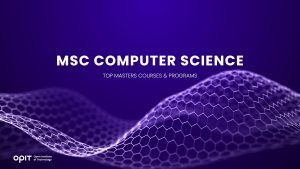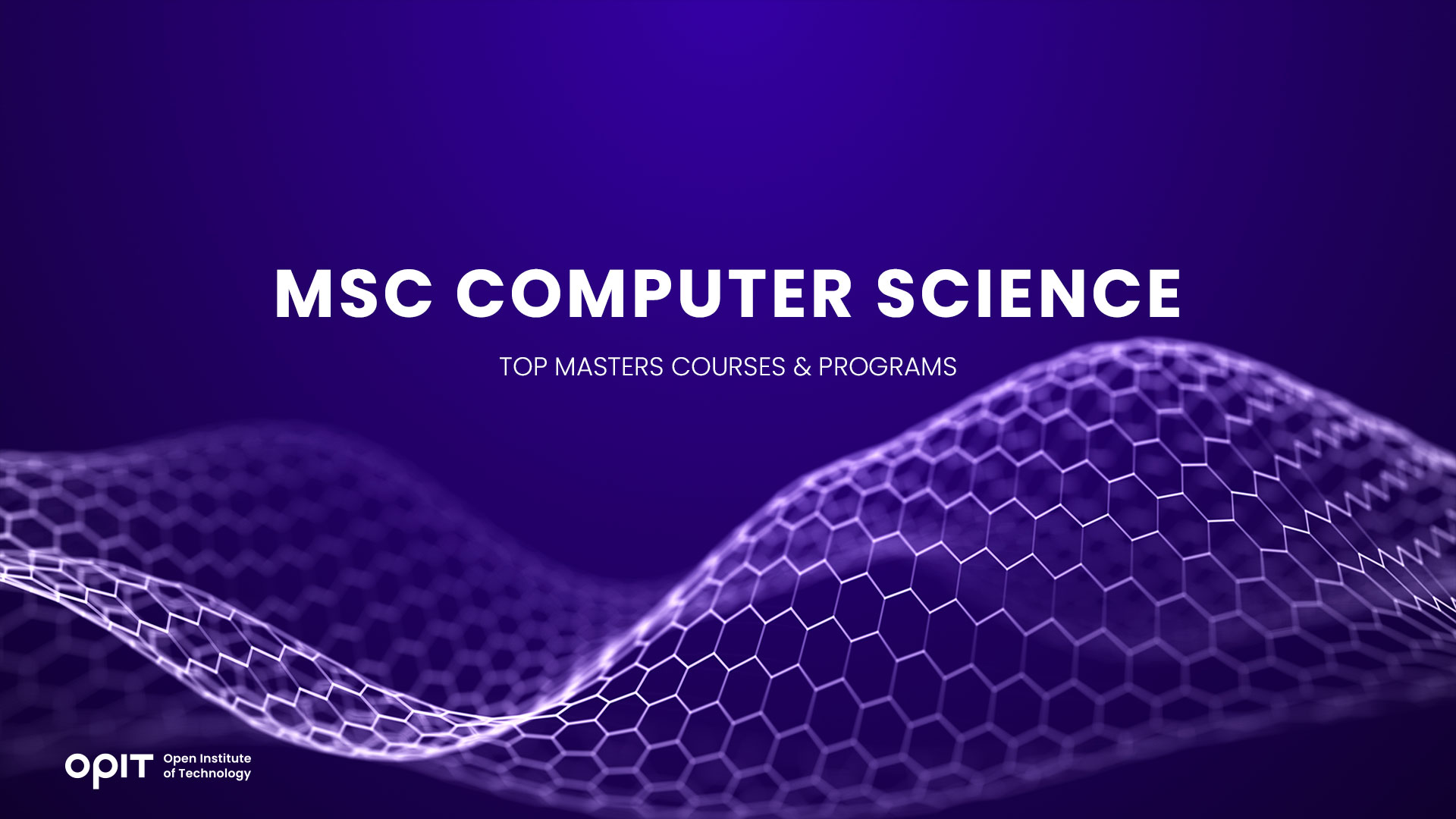

Finding an industry or even area of life that doesn’t utilize digital technologies is quite a challenge today. As computers continue to impact the ways we do business and live, understanding their capabilities and limitations becomes essential. This is the gist of what computer science is all about.
The tasks of computer science keep growing in scope and complexity. This means the demand for professionals in the field is always on the rise. Global companies are always on the lookout not only for people who know computer science but are also experts in the field.
For these reasons, getting an MSc in Computer Science can be the best career move in the modern landscape. Masters in Computer Science allows you to gain detailed knowledge and choose a specialized path. Better yet, holding such a degree elevates your chances of landing a well-paid job at a respectable organization.
Getting an MSc Computer Science is undoubtedly a good idea. You can even do it online, with all of the conveniences of remote learning. Let’s look at the best Masters in Computer Science courses and find out what they offer in terms of professional development.
Factors to Consider When Choosing an MSc Computer Science Program
Picking the right course may be something of a challenge. Numerous institutions offer quality programs, so you might not know where to start or what to look for when making the decision. Here are the key factors that should influence your choice.
Firstly, the reputation of the institution providing the course will matter greatly. Leading universities and learning organizations will offer the most comprehensive programs. Plus, their degrees will be accredited and recognized worldwide.
Next, you’ll need to choose a particular curriculum and specialization that fit your needs and interests. Computer science is a broad field of study, so picking the right study path will be necessary.
The institution you enroll in should have quality faculty members. This aspect is relatively straightforward: If you pick a reputable university, chances are the faculty will be up to par. On a similar note, such institutions will provide ample research opportunities.
The financial aspect is, of course, another important factor. Tuition fees differ considerably between institutions, and some may provide considerable aid for upcoming students. Yet, that doesn’t mean you should opt for the most affordable variant – the combination of a reasonable price and quality education will be the winning one.
When studying on-campus, the location and facilities will be crucial. While not the deciding factor, this may be a tipping point when comparing two otherwise evenly matched institutions.
Lastly, career support is one of the most important advantages you can get from an MSc program. Some institutions provide considerable opportunities for career development, connecting students with leading companies in the field. Additionally, network-building options will matter in this regard.
Top MSc Computer Science Courses and Programs
Norwegian University of Science and Technology
- Location: Gjøvik, Norway
- Duration: Two years
- Study Mode: Full-time
- Requirements: Informatics bachelor’s or engineering degree; minimum average grade: C; minimum informatics credits: 80; documented informatics and mathematics knowledge
- Tuition fees: No fees
- Scholarships/Financial aid: Free program – no financial aid needed
- Career prospects: Machine learning, gaming industry, AI, VR; possibility of Ph.D. program application
Check out MSc in Computer Science at the Norwegian University of Science and Technology.
KHT
- Location: Stockholm, Sweden
- Duration: Two years
- Study Mode: Full-time
- Requirements: Bachelor’s degree from a Swedish or another recognized university in informatics, computer science, or mathematics (minimum 180 ECTS credits); proficient use of the English language – IELTS 6.5, TOEFL 20, PTE 62, ESOL C1 (minimum 180 points)
- Tuition fees: SEK 310,000; application fee is SEK 900
- Scholarships/Financial aid: Scholarships are available from KTH, the Swedish Institute, and associated organizations; full and one-year scholarships available
- Career prospects: Graduates from KHT have moved forward to Ph.D. studies worldwide or found jobs at leading tech companies like Google, Oracle, Saab, Spotify, and Bloomberg.
Check out MSc in Computer Science at KHT.
University Leiden
- Location: Leiden, Netherlands
- Duration: Two years
- Study Mode: Full-time
- Requirements: Bachelor’s degree in AI, Bioinformatics, Computer Science or a related program; English proficiency – IELTS 6.5, TOEFL 90
- Tuition fees: Students from the EU, Suriname, or Switzerland: €2,314 yearly; other students: €19,600 yearly
- Scholarships/Financial aid: Various scholarships available; EU students under the age of 30 are eligible for a Dutch government loan
- Career prospects: Careers in AI, computer science and education, data science, and advanced computer systems
Check out MSc in Computer Science at University Leiden.
Specializations Within MSc Computer Science
Computer science has numerous subcategories and fields of study. These fields are widely different, so you’ll need to choose your specialization carefully. Let’s look at the key disciplines of computer science that you can specialize in and what those disciplines mean.
Artificial Intelligence and Machine Learning
As a field of computer science, AI deals with methods and technologies that allow machines to simulate human intelligence. This includes machine learning, deep learning, and similar disciplines. Through learning methods, either assisted or unassisted by humans, machines can process data and draw conclusions somewhat independently.
Data Science and Big Data Analysis
Data science, as the name implies, deals with data gathering, processing, and analysis. This facet of computer science is particularly important, as it finds plenty of practical applications in business, other sciences, demographics, and statistics.
A subset of data science, big data analysis focuses on extracting information from massive databases. A data scientist’s job is to compile the data and use advanced technological solutions to draw meaningful conclusions. The volumes of data analyzed this way far surpass anything that humans can achieve without computer assistance.
Cybersecurity and Information Security
Today, cybersecurity counts among the most important facets of computer science. Other disciplines gather, produce, and store copious amounts of data which often contain sensitive information. Unfortunately, modern criminals prey on that information to gain access to financial accounts, steal confidential data, and blackmail businesses and individuals.
Cybersecurity attempts to foil attacks from malicious parties. As the methods of crime evolve, so do the technologies meant to fight them. From phishing prevention to protection from hacking, cybersecurity, and information security ensures sensitive data doesn’t end up in the wrong hands.
Software Engineering and Development
Software is at the core of all computer systems, and it’s an ever-evolving aspect of computer science. New software solutions are needed practically every day, and that’s where software engineering and development come in.
Software engineers design new programs and work out how to implement them. Developers work on finding novel solutions to practical and theoretical challenges. These two branches of computer science are responsible for helping machines keep up with users’ demands, both privately and professionally.
Human-Computer Interaction and User Experience Design
We might not think much about the way we interact with computers. At least that’s the case if the user experience is done right. Designing the elements that people use in regular interaction reflects how efficiently computer systems work. Without quality user experience or means of interaction, software alone doesn’t serve much purpose.
Networking and Cloud Computing
A standalone computer system is a rarity these days. Networking, the internet, and cloud computing unlocked the full potential of the digital world. Today, computers can do their best when connected online, which is why these aspects of computer science count among the most important today.
Internet of Things and Embedded Systems
The Internet of Things (IoT) refers to a network of interconnected smart devices. This technology makes smart homes possible, but that’s only a small part of what IoT can do. Automated manufacturing, logistics, and numerous other complex systems function on this principle. In a sense, IoT and embedded systems represent the pinnacle of computer science since it brings together all other fields of research.
Tips for a Successful MSc Computer Science Application
Applying for an MSc in Computer Science is a step that shouldn’t be taken lightly. Your application will require careful consideration, particularly regarding the career path you wish to take. It would be best to start with a list of programs that fit your chosen field of research.
Once you have that list, you should narrow the choice according to the specific criteria that we listed here. To recap, those criteria are:
- The institution’s reputation and accreditation
- The curriculum
- Faculty and opportunities for research
- Fees and scholarships/financial aid
- Location and facilities
- Networking opportunities and career support
After you choose the program, it will be time to prepare the strongest application possible. You’ll have the best chances of getting accepted into the program with a well-written statement of purpose, the appropriate letters of recommendation, test scores and academic transcripts, and written proof of extracurricular activities and work experience.
Lastly, you should prepare to visit the campus and schedule an interview. Don’t disregard this aspect of the application process, as it could easily determine whether you’ll get accepted.
Start Your Computer Science Master’s Journey Today
Getting an MSc in Computer Science may be a significant boost for your career. Select the right program, and you might find yourself at the top of the job market. If your interests fall into any field of computer science, consider enrolling in a master’s program at a leading institution – it will be an excellent career move.
Have questions?
Visit our FAQ page or get in touch with us!
Write us at +39 335 576 0263
Get in touch at hello@opit.com
Talk to one of our Study Advisors
We are international
We can speak in:




